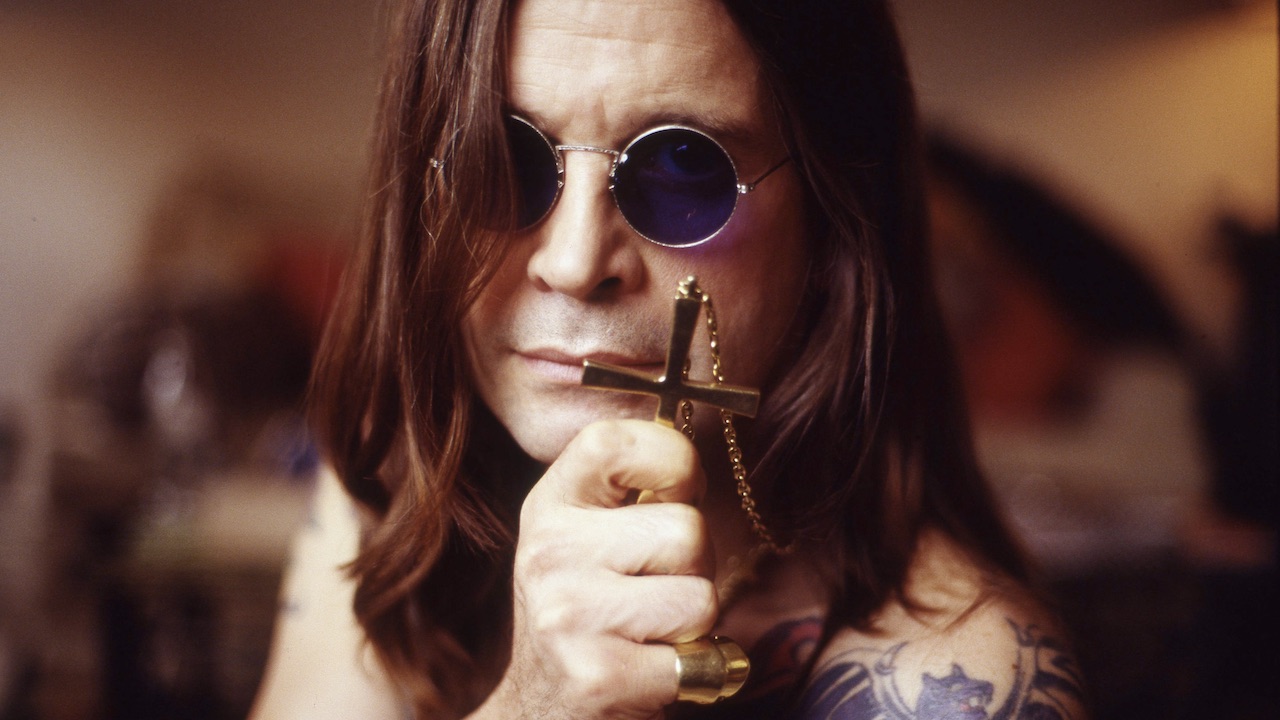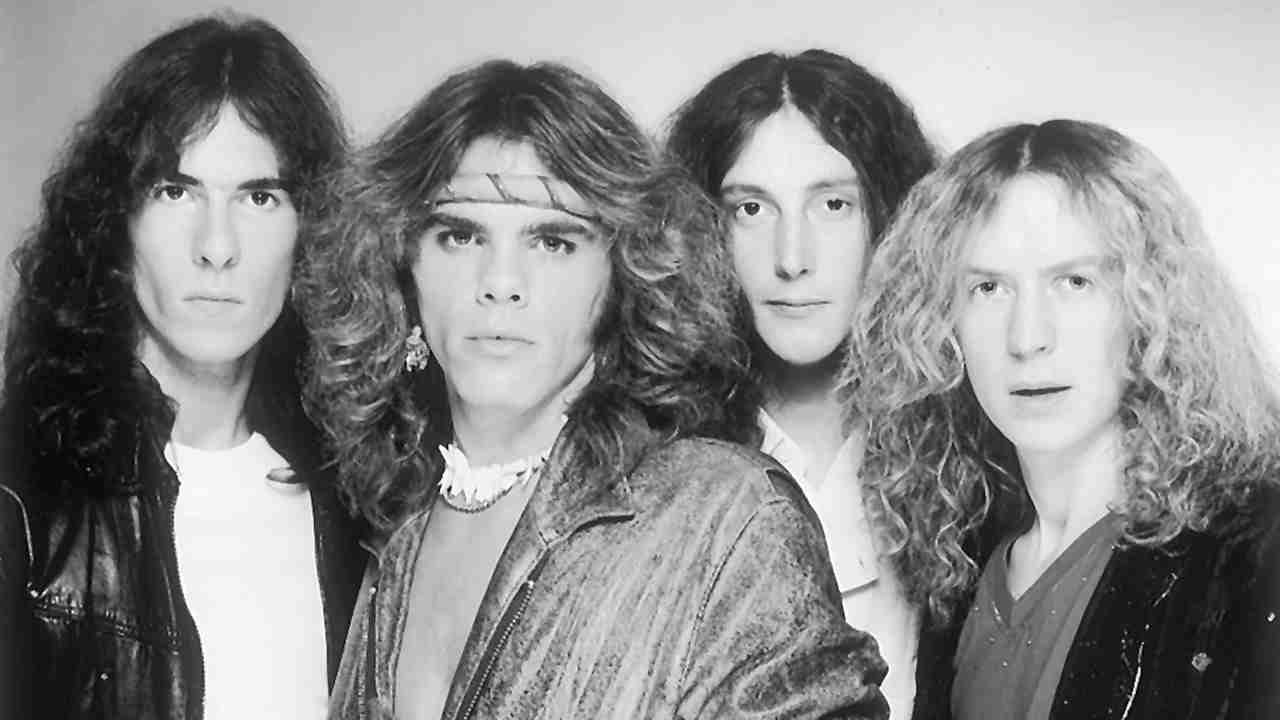Ozzy Osbourne 1948 - 2025
A true musical icon, Ozzy Osbourne was one of the architects of our world, the self-styled Prince Of Darkness who brought joy to millions, and inspired generations of musicians across the globe. We will never see his like again. This is his remarkable story

At the height of his excess, his nine lives took top billing. But as Ozzy Osbourne liked to point out, he’d also had two separate births.
Born John Michael Osbourne in Aston, Birmingham, on December 3rd, 1948, decades later, he would describe himself as a “kid who was afraid of everything”; a poverty-stung petty thief whose lack of washing facilities meant he “felt like a peasant”; a class clown who joked to deter bullies and defang the sadness he said walked alongside him for 76 years.
But that first life ended on the fateful day in 1968 when Osbourne pinned a classified ad to the noticeboard of a Birmingham music shop (‘Ozzy Zig needs gig’). That act set in motion Ozzy’s ascent as the singer for Earth, soon renamed Black Sabbath, the band that fired the starting pistol for heavy metal: an unholy new genre that in the hands of guitarist Tony Iommi, bassist Geezer Butler and drummer Bill Ward was the auditory equivalent of falling anvils.
As Sabbath advanced, John Osbourne was usurped by the emerging Ozzy persona: a mad-eyed dervish whose head-banging stage presence was the perfect match for the band’s Panzer tank groove.
“I think there’s a wildman in everybody,” he said once. “I’m a split personality. Ozzy Osbourne and John Osbourne are two different people. John Osbourne is talking to you now. But if you want me to be Ozzy Osbourne” – a flash of mania danced in his eyes – “then it takes over.”
Within the ranks of Sabbath, nobody questioned Tony Iommi's dominance: the guitarist was in the year above Osbourne at Birchfield Road Secondary Modern School, and even into his seventies, the singer claimed “Tony intimidates the fuck out of me, and he knows it”.
But while Osbourne was chiefly recruited for the Vox PA speakers gifted by his beloved father, the singer proved far more than a passenger or resident buffoon.
Revisit Sabbath’s classic early output and you’ll be reminded of a strange, unsettling, utterly unique vocal that makes your skin tingle and crawl. War, witchcraft, mental illness… no other golden-era rock vocalist could have sold Geezer Butler’s troubled lyrics better, because it seemed feasible that Osbourne was living every line. From the witch’s cat yowl that coils through the spooky opening title track of 1970’s seminal Black Sabbath, to the gleeful-sounding observation of War Pigs’ burning bodies, and the bereft upper-register monotone of Paranoid, Osbourne brought the razor edge to a band whose riffing was the archetypal blunt instrument.
Sign up below to get the latest from Classic Rock, plus exclusive special offers, direct to your inbox!
Those first albums were epochal, providing a sonic template that inspired generations of musicians. In his speech inducting Sabbath into the Rock And Roll Hall Of Fame in 2006, Metallica frontman James Hetfield spoke of encountering the band for the first time, of his nine-year-old self discovering “a powerful, loud, heavy sound” that moved his soul.
“If there was no Black Sabbath,” drummer Lars Ulrich acknowledged, “I could still possibly be a morning newspaper delivery boy.”
Foo Fighters leader Dave Grohl is just as unequivocal.
“I love Black Sabbath,” he told Kerrang! In 1997. “They made an amazing contribution to music today. Almost every band that made it big in the Nineties, including Soundgarden and Nirvana, owe a debt to them. We were totally into them in Nirvana.”
“I love Ozzy, too,” Grohl added. He was once considered 'The Most Evil Man In Rock' and yet he's the cutest and funniest guy in rock, too. He's just a little kid… with a hash pipe in his mouth!"
As Grohl intimated, for all his wildness, there was a vulnerability about Ozzy, too, that meant he often took the role of fall guy. During sessions for 1972’s Vol.4, the Sabbath lineup were all living “the rock star life” – but Ozzy was deemed to have fallen furthest into bad ways, and by decade’s end, following the release of Never Say Die!, he was sacked, later replaced by Ronnie James Dio.
Sodden with drink, nostrils frosted with coke, written off by the industry and holed up in squalor at a West Hollywood hotel, the best Osbourne could hope for, he remembered, was to have “one last blast with the booze and dope, fuck as many tarts as I can and then go home. And then one day Sharon came around…”
The daughter of the formidable old-school rock manager Don Arden, the toughness in Sharon Arden’s DNA was the decisive factor in pulling Osbourne out of the dirt for 1980’s massive-selling Blizzard Of Ozz. It was a spectacular comeback album driven by the neo-classical flash of the young Californian guitarist Randy Rhoads, whose tragic death in a 1982 aircraft prank gone wrong would be one of the great sorrows of Ozzy’s life.
Sharon Osbourne proved a much-needed steadying rock throughout this stormiest of lives, even if the marriage they embarked upon that same year was nobody’s idea of a Mills & Boon romance (Ozzy, hearing voices, once tried to strangle her). It’s hard to imagine that Ozzy’s solo career would have flown so high without her firm hand – or that any other rock spouse would have tolerated a rap sheet that included urinating on the Alamo, falling asleep face-down in his dinner during an interview with journalist Mick Wall and biting the heads off a menagerie of wildlife.
Asked in 2020 what he wanted as his epitaph, Ozzy didn’t miss a beat: “Bats taste like shit.”
Ozzy’s antics might have set a high bar for others to follow, but those first two solo albums – Blizzard and Diary Of A Madman – stood up in their own right, buoyed by the brilliance of Rhoads, shoulder to shoulder with the best of Sabbath’s work. Tom Morello nails it: "Coming out of probably the greatest heavy metal band of all time in Black Sabbath, to find a musical partner that could help build a catalog with the greatest hard rock songs of all time, that's a miracle right there."
Appearing in Penelope Spheeris’s 1988 documentary, The Decline Of Western Civilization Part II: The Metal Years, Osbourne already looked a little fragile, spilling orange juice on his kitchen worktops. By 2002, when his profile was reignited by The Osbournes reality TV series, he had settled into a cosier, more avuncular role: the notion of the Prince Of Darkness terrifying anyone now seemed remote. But while the show painted him as incompetent – struggling to operate TV remotes and so on – interviewers discovered a man who was still honest, sharp and fiercely witty, even after he revealed he was suffering with Parkinson’s in 2020.
To casual observers, it will probably be the bat and The Osbournes that bubble to the top of their memories of Ozzy Osbourne in the days to come. Music fans know better. Osbourne belonged to that exclusive club of rock stars who segued from a legendary band to an equally storied career of his own. Looking back now, it’s debatable whether Sabbath or his solo output is the main event. Crazy Train is every bit as vital a signature tune as Paranoid. 2022’s Patient Number 9 was an equally impressive swansong as 2013’s valedictory 13. Whichever way you slice it, it’s an extraordinary body of work: the substance that will outlive the ephemeral tales of substance abuse.
Black Sabbath’s farewell Back To The Beginning show on July 5 at Birmingham’s Villa Park stadium, located within a plectrum flick of the streets that the band’s four original, and reunited, members grew up on, was unforgettable and emotional, not merely because of the astonishingly influential, timeless music it showcased, but for the sheer outpouring of love and respect every musician who graced the stage directed towards the Godfathers of Metal, and their stricken, but unbowed frontman in particular.
The last of his nine lives might have been used up – but Ozzy Osbourne’s legacy is cast in stone. As the focal point, face and frontman of the band who not only co-created the metal genre, but made it look like the best party in town, you couldn’t forget him if you tried.
And the world never, ever will.
John Michael ‘Ozzy’ Osbourne
December 3, 1948 - July 22, 2025
Henry Yates has been a freelance journalist since 2002 and written about music for titles including The Guardian, The Telegraph, NME, Classic Rock, Guitarist, Total Guitar and Metal Hammer. He is the author of Walter Trout's official biography, Rescued From Reality, a music pundit on Times Radio and BBC TV, and an interviewer who has spoken to Brian May, Jimmy Page, Ozzy Osbourne, Ronnie Wood, Dave Grohl, Marilyn Manson, Kiefer Sutherland and many more.
You must confirm your public display name before commenting
Please logout and then login again, you will then be prompted to enter your display name.

